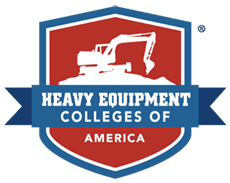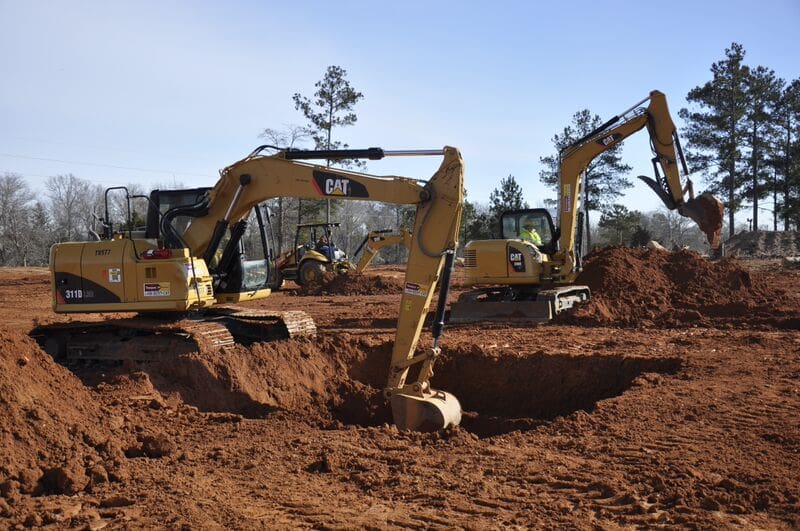Compact or mini excavators are relatively new to the heavy equipment industry. The first compact excavators hit the heavy equipment market in Japan during the very late 1960s. It wasn’t until the ’80s that compact excavators made their way to North America. While they are still more popular in Asia and Europe, the demand for mini excavators has been consistently picking up in North America.
With that brief history lesson out of the way, let us familiarize ourselves with the essential information about compact excavators:
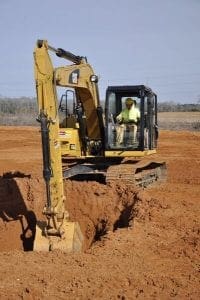
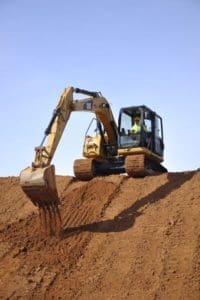
What are they?
Compact excavators, as the term indicates, are smaller versions of excavators. They consist of the same parts as a full-size traditional excavator but on a smaller scale. Mini excavators are composed of a boom arm, bucket, tracks on the undercarriage and a cab that allows for 360 degrees of rotational maneuverability. Most compact excavators have boom arms whose maximum dig depth is between eight and 12 feet, with a max dump height of around eight inches longer than the dig depth. Compact excavators typically have an operating weight of less than 10,000 pounds.
What do they do?
As you could probably guess judging from the previous section, compact excavators do exactly what their larger counterparts do, albeit on a smaller scale; they dig. A smaller machine means a lighter max lifting load. They also have shorter arms to dig shallower holes. They are better for smaller jobs in smaller spaces that a larger excavator would have trouble fitting into.
What are their advantages?
There are many advantages of using a compact excavator compared to a normal excavator or other heavy equipment machine. The biggest advantage is the compact size, which allows for superior maneuverability. Quite simply, compact excavators can fit places where full-size excavators cannot, such as in an already crowded construction site. They are also lighter, which means they are easier to transport and won’t leave as heavy track marks on the ground. That’s good if you’re worried about it tearing up your lawn during a personal home project. Additionally, there are a number of diverse attachments available to be mounted to the boom arm of the excavator. One last benefit of compact excavators is longevity. They don’t lift as much weight, and the tasks aren’t typically as rigorous, so they tend to last longer than their larger counterparts.
Excavators for Beginners: 5 Things to Know About Operating
The construction industry expects to grow 5% over the next eight years*. This means trained operators will be in high demand. If you’re thinking about a career shift, or want to learn more about operating excavators, you’ve come to the right place.
More Information Here!When should you use one?
The answer to this question depends on the type of project you’re looking to complete. If you’re a contractor looking to complete a project that requires excavation in the middle of other work going on simultaneously, the manageable size of the compact excavator makes it the way to go. If you’re looking to dig a hole in your backyard for a pool or tear up some concrete to redo your driveway, compact excavators are also a good choice. Essentially, you want to use a compact excavator for small home projects or in settings where you need to dig in a small space. Again, it depends on the project.
What does the future hold?
As we mentioned in the opening, compact excavators are gradually gaining popularity across North America. This will likely continue to be the case as heavy equipment rental companies and contractors upgrade old machines in favor of mini excavators. Heavy equipment isn’t cheap, so owners usually don’t like to purchase new machines until it’s absolutely necessary.
It’s an exciting time to enter the field of heavy equipment operation. As compact excavators become more and more commonplace, it’s possible they may become part of more heavy equipment program curricula. Don’t miss out on the action of a fulfilling career; start your education in heavy equipment with the friendly folks at HEC.
Dig up a new career at HEC
Heavy Equipment Colleges of America (HEC) is one of America’s finest heavy equipment schools. At HEC, we teach students the essentials of heavy machine operation and prepare them for meaningful work in the field after graduation. In addition, we offer lattice boom and mobile crane operation to complement our programs at six campuses across the country.
HEC has been training aspiring heavy equipment operators for over a decade, and we take pride in providing practical heavy equipment education tailored to meet the needs of our students. HEC’s programs implement a healthy balance of both textbook learning and hands-on experience to adequately prepare students for entry-level skilled trade jobs.
HEC would be nothing if it were not for the knowledge and guidance provided by its instructors. They have invaluable experience with heavy equipment and cranes, which allows them to provide students insight into the world of heavy equipment operation through lessons they learned from years on the job.
Our comprehensive heavy equipment operating courses can be completed in as little as three weeks. This allows you to save time and money compared to an associate or bachelor’s degree program while also providing you with the knowledge and competence you need to start your new career.
HEC can be the first step toward a rewarding career in the construction industry. To schedule a tour of the campus nearest you or to learn more about our programs, please visit us online at https://heavyequipmentcollege.edu/.
Relevant Posts About Excavators:

5 Benefits of Heavy Equipment Training
Whether you’re new to heavy equipment or a seasoned operator, a training program can boost your career. Here are the top five benefits.
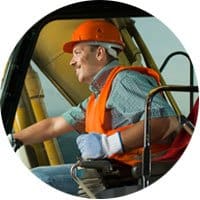
5 Benefits of Heavy Equipment Training
Table of Contents Whether you are a heavy equipment novice or an experienced operator looking to advance your career, completing a heavy equipment training program
